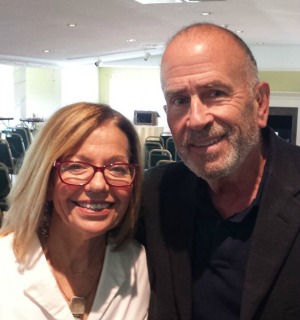 Written by Rabbi Jonah Geffen for APN.
Written by Rabbi Jonah Geffen for APN.
Rabbi Jonah Geffen serves as the spiritual leader of Congregation Shaare Zedek. A member of the New Shul's
Rabbinic Havurah, Rabbi Geffen was the National Rabbinic Director for the J Street Education Fund and spent two
years as a Marshal T. Meyer Rabbinic Fellow at Congregation B’nai Jeshurun on the Upper West Side.
The Torah instructs the Israelites how to celebrate the upcoming holiday of Shavuot:
In the book of Deuteronomy (ch. 26) we read that upon entering and dwelling in the Land of Israel, the people are
to take the “first of all the fruit of the ground” (v. 2), bring it to a designated place, and give it to G-d. As
the priest takes the produce, the person who has brought it is to state as follows:
(26:5) And thou shalt speak and say before the LORD thy God: ‘Arami oved avi, and he went down into Egypt,
and sojourned there, few in number; and he became there a nation, great, mighty, and populous…. (10) And now,
behold, I have brought the first of the fruit of the land, which Thou, O LORD, hast given me…
Arami oved avi. A seemingly simple phrase can actually be understood in two very distinct ways. Rashi, the
11th century sage sees a past of survival and near genocide. He focuses on the narrowly escaped destruction of the
Jewish people. Rashi explains that when the pilgrim brings first fruits “He mentions the loving kindness of the
Omnipresent saying, arami oved avi - an Aramean destroyed my father, which means: “Laban wished to
exterminate the whole nation” when he pursued Jacob” (Rashi on Devarim 26:5). He emphasizes that this fate is one
of which we remain at risk: this (near destruction) happened to us. Genocide is in our immediate past, because this
happened to my father.
 On Wednesday, June 29th, APN intern Rebeca Feldman attended a panel discussion on the
role of Syrian women journalist-activists. Following is her report:
On Wednesday, June 29th, APN intern Rebeca Feldman attended a panel discussion on the
role of Syrian women journalist-activists. Following is her report:
 From June 16-26, 2016, Israeli security expert Yossi Alpher, pictured on the right with APN
President and CEO Debra DeLee , spoke at APN sponsored events in New York City, Washington DC, Los Angeles, and
as the keynote speaker for the APN Luncheon in the Berkshire Mountains in Western MA.
From June 16-26, 2016, Israeli security expert Yossi Alpher, pictured on the right with APN
President and CEO Debra DeLee , spoke at APN sponsored events in New York City, Washington DC, Los Angeles, and
as the keynote speaker for the APN Luncheon in the Berkshire Mountains in Western MA.

 Hagai Elad, executive director of Israeli human rights organization B’Tselem, on a short visit to
Washington DC, was hosted Friday June 17th for a roundtable briefing by the New Israel Fund. NIF is one of
B’Tselem’s chief funders.
Hagai Elad, executive director of Israeli human rights organization B’Tselem, on a short visit to
Washington DC, was hosted Friday June 17th for a roundtable briefing by the New Israel Fund. NIF is one of
B’Tselem’s chief funders.
 Written by Rabbi Jonah Geffen for APN.
Written by Rabbi Jonah Geffen for APN.